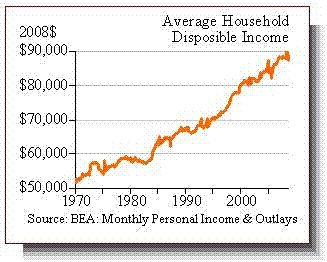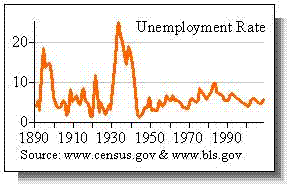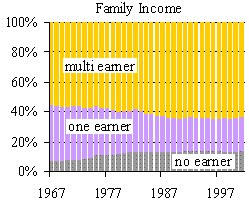Skip to comments.
The Economy Is Bad, but 1982 Was Worse
New York Times ^
| January 20, 2009
| DAVID LEONHARDT
Posted on 01/22/2009 3:09:01 AM PST by expat_panama
You often hear that we are now living through the worst recession since the early 1980s, and the comparison is not wrong. But it’s ultimately unsatisfying, because it is a little too vague to be useful.
Is the economy only a little worse than it was in the last couple recessions, as some have said, and still a long way from the dark days of 1982? Or are we instead on our way toward something that may even approach the severity of the Great Depression?
[snip]
The ranks of unemployed and underemployed, controlling for the size of the population, were much larger in 1982 than today.
[snip]
The recession of the early 1980s doesn’t have a catchy name, and almost half of Americans are too young to have any real memory of it. But it was terrible — qualitatively different from the mild recessions of 1990-91 and 2001. The first big blow to the economy was the 1979 revolution in, which sent oil prices skyrocketing. The bigger blow was a series of sharp interest-rate increases by the Federal Reserve, meant to snap inflation. Home sales plummeted. At their worst, they were 30 percent lower than they are even now (again, adjusted for population size). The industrial Midwest was hardest hit, and the term “Rust Belt” became ubiquitous. Many families fled south and west, helping to create the modern Sun Belt.
Nationwide, the unemployment rate rose above 10 percent in 1982, compared with 7.2 percent last month. But that rate has a couple of basic flaws, as I’ve discussed in previous columns. It counts people who have been forced to work part time, even though they want to work full time, as fully employed.
[snip]
(Excerpt) Read more at nytimes.com ...
TOPICS: Business/Economy; News/Current Events; Politics/Elections
KEYWORDS: 1982; bhoeconomy; depression; economy; recession
Navigation: use the links below to view more comments.
first previous 1-20 ... 41-60, 61-80, 81-100, 101-106 next last
To: Mase; dalereed
"...median family income still rose 2 percent during the decade, after adjusting for inflation. Over the past decade, it has fallen." Some belief systems are a lot easier to hold on to by never actually looking at the record. Fortunately we live in an age when anyone who wants to can see the BEA numbers for themselves.
Some belief systems are a lot easier to hold on to by never actually looking at the record. Fortunately we live in an age when anyone who wants to can see the BEA numbers for themselves.
Current real family incomes have steady grown, while families took a huge hit from the Carter mess. From '73 to '83 incomes didn't even grow by 2/10ths of a percent, and in the worst of it they actually fell for years on end. Today's real family incomes are up 14% from ten years ago.
Talk about your 'bald face lies'.
To: expat_panama
Excellent! The resident doomers would also be shocked to learn that the median household net worth has increased significantly over the past decade. Yes, the rich got richer but so has everyone else. Something about demagoguery beating data comes to mind.
82
posted on
01/22/2009 9:31:38 AM PST
by
Mase
(Save me from the people who would save me from myself!)
To: bronxboy
Yes, much. Here’s a link to get started: http://chronicle.com/temp/reprint.php?id=477k3d8mh2wmtpc4b6h07p4hy9z83x18
Note the parallels to today. Very frightening. And remember, today we start as a debtor nation. Much worse.
The only thing we have going for us is that we are the world’s reserve currency and as long as other countries are more leveraged than us, we will stay on top - even if the top is a lot lower than it has been.
83
posted on
01/22/2009 9:42:40 AM PST
by
nicola_tesla
(www.fedupusa.org)
To: nicola_tesla
"...read up on the depression of 1873 because that’s where we’re likely headed." If by any chance you've found actual records please share. The BLS only has numbers back into the 20th century and the Census Bur. only has unemployment back to 1890.
If by any chance you've found actual records please share. The BLS only has numbers back into the 20th century and the Census Bur. only has unemployment back to 1890.
Whatever we find, it's obvious that we're a lot better off now than we were then. The only difference of opinion we got here is whether the future will be better or worse.
Maybe we got too many freepers that think as long as they're going to be dead 50 years from now that they'd just as soon everyone else is crying about tomorrow too. IMHO that kind of attitude is selfish, wrong, and sick.
To: A.Hun
(.1% CPI increase) But that is the lowest increase since 1954, and the fall in prices has just begun. If prices go up, it's inflation, and we usually don't like very much of it. Most of us think price stability is good thing. So a CPI that goes up only 1% a year OR down 1% a year would be a good thing. Even after RR broke the back of inflation (the 10%/year kind) we've had about 3%, and we'd like it to be lower. So, where is the gloom and doom if we have 0, or even -2%?
To: BohDaThone
So, where is the gloom and doom if we have 0, or even -2%? For a government that has accumulated trillions in debt, inflation is the only way to pay back the bills. An extended period of zero inflation, or worse, deflation, will wreck the the economy.
86
posted on
01/22/2009 10:35:19 AM PST
by
Ditto
To: Ditto
"For a government that has accumulated trillions in debt, inflation is the only way to pay back the bills."No, economic growth is how we've been doing it.
A half century back total private wealth was five times the national debt. That was OK, but today's wealth is a dozen times greater than the debt. Not many people know that Americans donate millions of dollars yearly to the US treasury. At the rate we're going maybe some individual will celebrate the next centennial by voluntarily paying off the entire national debt.
To: Ditto
Whoa!! There’s the first “conservative” claim for the absolute desireability of inflation that I have ever seen!
To: expat_panama
89
posted on
01/22/2009 11:23:21 AM PST
by
nicola_tesla
(www.fedupusa.org)
To: BohDaThone
Whoa!! There’s the first “conservative” claim for the absolute desireability of inflation that I have ever seen! I never said it was desirable, and in fact it is not desirable. I was only relating the facts as they are on how this Ponzi (or Madoff) scheme we call the Federal government has been operating. Paying back old debt with inflated dollars has been a key element.
90
posted on
01/22/2009 12:08:08 PM PST
by
Ditto
To: nicola_tesla
Unemployment reached 14% by 1876That's how Wikipedia says they quoted "Bowers, Claude G. (1929), The Tragic Era. The Revolution After Lincoln.". It would be nice if we could verify whether Wiki got it right, of if there's some way to verify how Bowers came up with his 'guestimate'.
Whatever; let's say the 14% is true. It's been topped by 13 different twelve-month periods since.
To: expat_panama
Define how we’re better off than any other time.
We have more debt on the personal, corporate and government level than at any time in history, and we’re reaching for the stratosphere.
In many ways you can say we’re more vulnerable. In prior depressions people have gone home to the family farm where at least they could eat. People today don’t even know how to garden, let alone have a farm to fall back on.
Additionally, we are reliant on services provided by public utilities - electricity, water, sewer - and reliant on cars to get to work. Any breakdown in those areas due to money difficulties/bond failures is going to leave a lot of people without any thing to fall back on. At least in 1873 there were a lot of outhouses still in existence :)
Think Katrina. How long did it take for New Orleans to become a hellhole due to lack of services, no food, and gangs of roving thugs/looters ?
92
posted on
01/22/2009 1:03:30 PM PST
by
nicola_tesla
(www.fedupusa.org)
To: expat_panama
Household - there’s the catch - and the proportion of households with 2 working heads as opposed to 1 in those years is...
(don’t have time to look for better data right now)
http://en.wikipedia.org/wiki/Household_income_in_the_United_States
Income inequality in the United States, which had decreased slowly after World War II until 1970, began to increase in the 1970s until reaching a peak in 2006. It declined a little in 2007.[9] Households in the top quintile, 77% of which had two or more income earners, had incomes exceeding $91,705. Households in the mid quintile, with a mean of approximately one income earner per household had incomes between $36,000 and $57,657. Households in the lowest quintile had incomes less than $19,178 and the majority had no income earner.[10]
The 2006 economic survey also found that households in the top two income quintiles, those with an annual household income exceeding $60,000, had a median of two income earners while those in the lower quintiles (2nd and middle quintile) had median of only one income earner per household.
If you want a valid comparison, look at individual earnings. Then compare that to the growth in debt of all entities and you’ll see that all income/asset gains were built on the back of debt.
93
posted on
01/22/2009 1:11:40 PM PST
by
nicola_tesla
(www.fedupusa.org)
To: BohDaThone
Deflation
Since 1930 it has been the norm in most developed countries for AVERAGE PRICES to rise year after year. However, before 1930 deflation (falling prices) was as likely as INFLATION. On the eve of the first world war, for example, prices in the UK, overall, were almost exactly the same as they had been at the time of the great fire of London in 1666.
Deflation is a persistent fall in the general price level of goods and SERVICES. It is not to be confused with a decline in prices in one economic sector or with a fall in the INFLATION rate (which is known as DISINFLATION).
Sometimes deflation can be harmless, perhaps even a good thing, if lower prices lift real INCOME and hence spending power. In the last 30 years of the 19th century, for example, consumer prices fell by almost half in the United States, as the expansion of railways and advances in industrial technology brought cheaper ways to make everything. Yet annual real GDP GROWTH over the period averaged more than 4%.
Deflation is dangerous, however, more so even than inflation, when it reflects a sharp slump in DEMAND, excess CAPACITY and a shrinking MONEY SUPPLY, as in the Great DEPRESSION of the early 1930s. In the four years to 1933, American consumer prices fell by 25% and real GDP by 30%. Runaway deflation of this sort can be much more damaging than runaway inflation, because it creates a vicious spiral that is hard to escape. The expectation that prices will be lower tomorrow may encourage consumers to delay purchases, depressing demand and forcing FIRMS to cut prices by even more. Falling prices also inflate the real burden of DEBT (that is, increase real INTEREST rates) causing BANKRUPTCY and BANK failure. This makes deflation particularly dangerous for economies that have large amounts of corporate debt. Most serious of all, deflation can make MONETARY POLICY ineffective: nominal interest rates cannot be negative, so real rates can get stuck too high.
http://www.economist.com/research/Economics/alphabetic.cfm?letter=D&CFID=29650468&CFTOKEN=64120487
This answers better than I could why I’m so worried and believe the drop in food and clothing prices are worth watching. Its not bad yet, but I firmly believe it will be.
94
posted on
01/22/2009 1:32:25 PM PST
by
A.Hun
(Common sense is no longer common.)
To: nicola_tesla
Define how we’re better off than any other time.You first.
"We have more debt on the personal, corporate and government level than at any time in history..."
Over $51 trillion, and we owe it to each other. That means Americans own more stocks, bonds, mortgages, and hold more IOU's than any time in history. This is what happens when an economy expands, and an expanding economy is a good thing not a bad thing.
In prior depressions people have gone home to the family farm where at least they could eat.
What a blast from the past, I didn't thing anyone still actually believed that. That notion was all the rage about a hundred years ago with farming co-ops like the Grange. My grandfather got conned into believing it and may dad almost starved to death.
To: nicola_tesla
96
posted on
01/22/2009 1:42:15 PM PST
by
Centurion2000
(01-20-2009 : The end of the PAX AMERICANA.)
To: nicola_tesla
"...the proportion of households with 2 working heads as opposed to 1 in those years is... (don’t have time to look--" Here you go, it's an old graph of Census Br. numbers. When I first looked at it I got mad at all the 'no earner' families, but decided to not feel so bad when I realized that I just retired and sent my kids of to college on my savings. In other words, I'm causing the increase in 'no-earner' households. ;-)
Here you go, it's an old graph of Census Br. numbers. When I first looked at it I got mad at all the 'no earner' families, but decided to not feel so bad when I realized that I just retired and sent my kids of to college on my savings. In other words, I'm causing the increase in 'no-earner' households. ;-)
"Income inequality in the United States, which had decreased slowly after World War II until 1970, began to increase..."
It's good you're bringing up income equality (from Wiki's 'quotes' from the New York Times) because now we can agree that average incomes have grew nicely over the past decade and that they'd fallen with Carter. Now the idea is that even with bigger incomes we say it's still bad because our increase in income isn't as much as someone else's.
Reminds me of giving one of my kids a chocolate bar and hearing him cry because it wasn't as big as his brother's chocolate. How about we agree that our new tack is a bit childish?
"...look at individual earnings. Then compare that to the growth in debt of all entities and you’ll see that all income/asset gains were built on the back of debt."
If by chance you've made this comparison yourself, please share the numbers so I can follow your thoughts better.
To: expat_panama
No, economic growth is how we've been doing it.
98
posted on
01/22/2009 6:54:42 PM PST
by
Ditto
To: Ditto
Sometimes we borrow and sometimes we do without. Borrowing to buy arms for fighting Hitler was a good thing, and I’m sure glad my parents didn’t decide to just save money and ‘do without’.
To: cva66snipe
No they kept C&C separate from United American. CH, Jr was in the process of building his C&C headquarters when the Banks fell. It became the Riverview Tower where BB&T is now.
Navigation: use the links below to view more comments.
first previous 1-20 ... 41-60, 61-80, 81-100, 101-106 next last
Disclaimer:
Opinions posted on Free Republic are those of the individual
posters and do not necessarily represent the opinion of Free Republic or its
management. All materials posted herein are protected by copyright law and the
exemption for fair use of copyrighted works.
FreeRepublic.com is powered by software copyright 2000-2008 John Robinson
Some belief systems are a lot easier to hold on to by never actually looking at the record. Fortunately we live in an age when anyone who wants to can see the BEA numbers for themselves.
